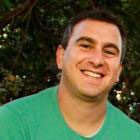 Matthew Mazloff is a researcher in the Oceans and Atmospheres Section at Scripps Institution of Oceanography, University of California, San Diego. His research focuses on understanding the ocean and Earth system by utilizing model-observation syntheses. The estimates of the ocean state produced allow one to address pressing scientific and societal problems. Providing quantitative ocean baselines allows the detection of past and future climate shifts, and enables understanding the underlying dynamics controlling the system. Analyses using these state estimates span a broad range of topics, including air-sea exchanges, the carbon cycle, the ocean circulation, and the dynamical balances governing this circulation.
Matthew Mazloff is a researcher in the Oceans and Atmospheres Section at Scripps Institution of Oceanography, University of California, San Diego. His research focuses on understanding the ocean and Earth system by utilizing model-observation syntheses. The estimates of the ocean state produced allow one to address pressing scientific and societal problems. Providing quantitative ocean baselines allows the detection of past and future climate shifts, and enables understanding the underlying dynamics controlling the system. Analyses using these state estimates span a broad range of topics, including air-sea exchanges, the carbon cycle, the ocean circulation, and the dynamical balances governing this circulation.
Mazloff studies many ocean regions but has an affinity for the Southern Ocean. After receiving a B.S. in physics from the University of Vermont, he pursued his PhD in the Massachusetts Institute of Technology (MIT) – Woods Hole Oceanographic Institution (WHOI) joint program studying the momentum budget of this remote and energetic ocean. He then joined Scripps and continued this line of research, expanding it to include the carbon cycle and ice-ocean interactions in the region. Other regions of study include the California Current System and the tropical Pacific Ocean.
A primary focus of Mazloff’s efforts is evolving methodologies for data assimilation and mapping. A priority for best-exploiting observations is to improve ocean models and assimilation software. Including more physical components in the model-observation synthesis is key to this goal. Having a model that assimilates measurements of all ocean scales, from surface waves to internal waves to submesoscale to mesoscale to basin scale, allows the best use of measurements and knowledge of the associated uncertainty structure. Aligned with these goals, Mazloff works in the consortium for Estimating the Circulation and Climate of the Ocean (ECCO), and as such, he is a user and developer of the ECCO data assimilation software. These efforts have also been used to aid in observing system design.
(Updated January 2021)
Current Activities and Associations
- Producing a biogeochemical Southern Ocean state estimate (sose.ucsd.edu)
- NASA Physical Oceanography Distributed Active Archive Center (PO.DAAC) User Working Group (2020 to present; https://podaac.jpl.nasa.gov/AboutPodaac)
- Member of SOOS Southern Ocean Fluxes working group (2017 to present; http://www.soos.aq/activities/capability-wgs/soflux) and Observing System Design working group (2018 to present; http://www.soos.aq/activities/capability-wgs/soflux)
- Member of the Surface Water and Ocean Topography (SWOT) altimeter Science Definition Team (2012 to present; https://swot.jpl.nasa.gov)
- Member of the consortium for Estimating the Circulation and Climate of the Ocean (ECCO; http://ecco-group.org/)
- Member of the Southern Ocean Carbon and Climate Observations and Modeling project (SOCCOM; http://soccom.princeton.edu/)
Recent Activities
- Member of the CLIVAR Global Synthesis and Observations Panel (GSOP; 2019 to 2023; http://www.clivar.org/clivar-panels/gsop)
- Member of SOOS Scientific Steering Committee (2015-2021; https://soos.aq/about-us/scientific-steering-committee)
Postdocs
- Manuel Gutierrez-villanueva (2022-2024)
- Tien-Yiao Hsu (2022-)
- Paul Chamberlain, postdoc (2022-)
- Yu Gao, postdoc (2022-2024)
- Lydia Keppler, postdoc (2022-2024)
- Angela Kuhn Cordova, postdoc (2022-2023)
- Mara Freilich, postdoc (2021-2023)
- Rui Sun, postdoc (2019-2022)
- Natalie Freeman, postdoc (2017-2020)
- Antoine Hochet, postdoc (2018-2019)
- Isa Rosso, postdoc (2015-2019)
- Jinbo Wang, postdoc (2013-2015)
Students
- Lauren Harvey, SIO graduate student (2025-present)
- Jack Bassham, SIO graduate student (2024-present)
- Caeli Griffin, SIO graduate student (2024-present)
- Kayli Matsuyoshi, SIO graduate student (2024-present)
- Tommy Stone, SIO graduate student (2023-present)
- Dylan Shafer, SIO graduate student (2024-2025)
- Paige Brady, SIO graduate student (2023-2024)
- Ellen Davenport, SIO graduate student (2023-present)
- Kayleigh Jones, SIO graduate student (2022-present)
- Youran Li, SIO graduate student (2020-present)
- Alexander Andriatis, SIO graduate student (2019-2025)
- Lauren Hoffman, UCSD graduate student (2019-2023)
- Ratnaksha Lele, SIO graduate student (2019-2023)
- Srishti Dasarathy, SIO graduate student (2020-2023)
- Channing Prend, SIO graduate student (2019-2022)
- Luke Kachelein, SIO graduate student (2017-2023)
- Paul Chamberlain, SIO graduate student (2016-2022)
- Deborah Gardner, SIO graduate student (2019-2022)
- Stan Swierczek, UA graduate student (2018-2021)
- Bia Villas Boas, SIO graduate student (2014-2020)
- Veronica Tamsitt, SIO graduate student (2014-2018)
- Jessica Masich, SIO graduate student (2010-2017)
- Uriel Zajaczkovski, SIO graduate student (2009-2017)
- Ellen Briggs, SIO graduate student (2013-2017)
- E. Rachel Bernstein, Univ. of Del. graduate student (2010-2015)
- Ruth Musgrave, SIO graduate student (2009-2015)
